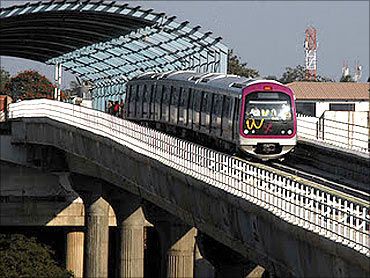The 'Smart city' programme is in danger of becoming cosmetic – creating showpieces instead of addressing endemic urban problems.
 The selection of 98 cities (two more are to follow) by the Union urban development ministry to be included under the new “smart cities” programme offers some insight into what matters in the eyes of both the central and state governments.
The selection of 98 cities (two more are to follow) by the Union urban development ministry to be included under the new “smart cities” programme offers some insight into what matters in the eyes of both the central and state governments.
According to a report in Business Standard, those that have made it have been “good boys” till now (done well on several criteria laid down by the central government), have the backing of the relevant state government (it wants to promote those cities) or simply because of “feasibility” – which can mean little more than convenience.
To take the least appealing reason first, the area of Delhi covered by the New Delhi Municipal Council (where reside ministerial and bureaucratic big shots) appears to have been chosen because it will be easier to work on.
This is, to use an old adage, like bringing coal to Newcastle. Making something already smart smarter is hardly a big deal, particularly when the most privileged reside there.
The smart city initiative ought to first address urban areas that need the most attention, so that they can be regarded as pilots from which lessons can be learnt on how to address the overall urban malaise.
The West Bengal government seems to be seized by the same mindset in proposing and getting included the two most modern outskirts of Kolkata – Bidhan Nagar and Newtown.
These are the best laid-out new developments in the state, intended to help the city expand; they are also next to the city’s information technology hub. Newtown in particular, as the name suggests, is still barely built up.
Creating a smart city there would not pose the kind of challenges that would have to be faced in, say, rejuvenating the relatively deprived areas of east Kolkata that border these townships.
On the other hand, one state government that has no desire to turn an existing business success into a civic showpiece is Karnataka.
It has left out Bengaluru, which has put India on the global knowledge map, because it is in such a terrible shape and very poorly governed. In seeking to make Bengaluru an urban success the state would have been able to use some of the best private advice available in the country – which has, for example, already created there a template for a smart road.
It does make sense to pick out secondary cities, as has been done, but there is no reason why Bengaluru could also not have been included; after all, Tamil Nadu has included Chennai.
Here the reality of politics may have played a part. Bengaluru has been run to the ground for the last five years with the BJP at the helm of the municipal corporation. But it has nevertheless been recently given a second term.
The Congress has been rebuffed by the electorate in its bid to capture power in the recent municipal elections because of its terrible anti-urban image.
Neither the BJP nor the Congress leaders of the state seem to have any idea about how to create and run a smart city.
With both the Centre and most of the states seeking the easy way out, the programme is in danger of becoming cosmetic – creating showpieces instead of addressing endemic urban problems.










 © 2025
© 2025